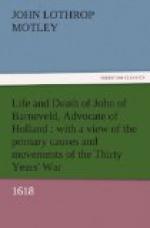“You will see,” he said, “the plan which a certain person zealous for the public good has proposed for reducing the Netherlanders to my obedience. . . . . You will please advise with Count Frederic van den Berg and let me know with much particularity and profound secrecy what is thought, what is occurring, and the form in which this matter ought to be negotiated, and the proper way to make it march.”
Unquestionably the paper was of grave importance. It informed the King of Spain that some principal personages in the United Netherlands, members of the council of state, were of opinion that if his Majesty or Archduke Albert should propose peace, it could be accomplished at that moment more easily than ever before. They had arrived at the conviction that no assistance was to be obtained from the King of France, who was too much weakened by tumults and sedition at home, while nothing good could be expected from the King of England. The greater part of the Province of Gelderland, they said, with all Friesland, Utrecht, Groningen, and Overyssel were inclined to a permanent peace. Being all of them frontier provinces, they were constantly exposed to the brunt of hostilities. Besides this, the war expenses alone would now be more than 3,000,000 florins a year. Thus the people were kept perpetually harassed, and although evil-intentioned persons approved these burthens under the pretence that such heavy taxation served to free them from the tyranny of Spain, those of sense and quality reproved them and knew the contrary to be true. “Many here know,” continued these traitors in the heart of the state council, “how good it would be for the people of the Netherlands to have a prince, and those having this desire being on the frontier are determined to accept the son of your Majesty for their ruler.” The conditions of the proposed arrangement were to be that the Prince with his successors who were thus to possess all the Netherlands were to be independent sovereigns not subject in any way to the crown of Spain, and that the great governments and dignities of the country were to remain in the hands then holding them.
This last condition was obviously inserted in the plan for the special benefit of Prince Maurice and Count Lewis, although there is not an atom of evidence that they had ever heard of the intrigue or doubt that, if they had, they would have signally chastised its guilty authors.
It was further stated that the Catholics having in each town a church and free exercise of their religion would soon be in a great majority. Thus the political and religious counter-revolution would be triumphantly accomplished.
It was proposed that the management of the business should be entrusted to some gentleman of the country possessing property there who “under pretext of the public good should make people comprehend what a great thing it would be if they could obtain this favour from the Spanish King, thus extricating themselves from so many calamities and miseries, and obtaining free traffic and a prince of their own.” It would be necessary for the King and Archduke to write many letters and promise great rewards to persons who might otherwise embarrass the good work.




